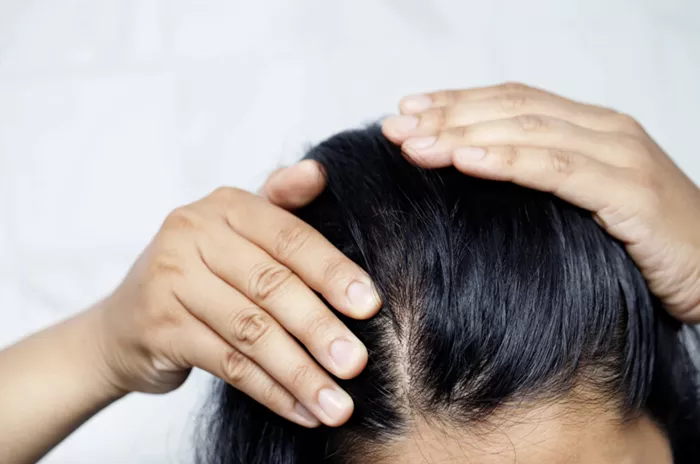Menopause is a natural phase in a woman’s life that marks the end of her reproductive years. During this time, women experience various changes in their body, including hormonal shifts that can significantly impact their hair. One of the most common concerns women face during menopause is thinning hair. This condition can lead to a loss of self-confidence and frustration, as hair plays an important role in personal appearance. The hormonal changes, especially the decrease in estrogen levels, are often the primary cause of hair thinning during menopause.
Fortunately, there are several treatments available that can help manage and even reverse this condition. In this article, we will explore the top six treatments for thinning hair during menopause that are safe, effective, and easy to implement.
Top 6 Treatment For Thinning Hair In Menopause
1. Hormone Replacement Therapy (HRT)
Hormone Replacement Therapy (HRT) is a common treatment for menopause-related symptoms, and it can also help with thinning hair. As estrogen levels decline during menopause, hair follicles can become weaker, leading to thinning. HRT works by replenishing estrogen levels in the body, which may help stimulate hair growth and reduce hair thinning.
There are different types of HRT, including:
Systemic HRT: This form of therapy includes pills, patches, or gels that deliver estrogen throughout the body.
Local HRT: These are treatments like creams or vaginal rings, which provide estrogen locally, particularly helpful for symptoms related to vaginal dryness, though they may have less impact on hair.
Before starting HRT, it is important to discuss the risks and benefits with your doctor, as this treatment may not be suitable for everyone.
2. Minoxidil (Rogaine)
Minoxidil, commonly known as Rogaine, is one of the most well-known treatments for hair thinning. It is a topical solution that you apply directly to the scalp. Minoxidil helps to stimulate hair growth by improving blood flow to the hair follicles and increasing their size, which can encourage hair to grow more densely.
Studies show that Minoxidil can be effective in both men and women, especially in the early stages of hair thinning. It may take several months to notice significant results, and it requires consistent use for continued effectiveness.
3. Nutritional Supplements
A balanced diet plays a crucial role in maintaining healthy hair, especially during menopause. During this time, women may experience changes in their nutritional needs, which could affect their hair health. Certain vitamins and minerals are essential for hair growth and can help combat thinning hair.
Some key nutrients to look for in supplements include:
Biotin: This vitamin is crucial for healthy hair and nails.
Vitamin D: Deficiency in Vitamin D has been linked to hair loss.
Iron: Low iron levels are a common cause of hair thinning.
Zinc: This mineral helps with hair regeneration and tissue growth.
Taking a daily supplement that includes these nutrients may help improve hair density and overall health.
4. Platelet-Rich Plasma (PRP) Therapy
Platelet-Rich Plasma (PRP) therapy is a medical procedure that involves using your own blood to stimulate hair growth. The process involves drawing a small amount of blood, processing it to concentrate the platelets, and then injecting it into the scalp. Platelets contain growth factors that can encourage the regeneration of hair follicles.
PRP therapy has shown promising results in both men and women with hair thinning due to hormonal changes. The treatment is minimally invasive and requires little downtime, making it a popular option for those seeking a non-surgical solution.
5. Laser Therapy
Low-Level Laser Therapy (LLLT) is a non-invasive treatment that uses red light to stimulate hair follicles and promote hair growth. The light penetrates the scalp, encouraging the production of energy within the hair cells, which can lead to thicker and stronger hair.
There are various devices available for home use, including laser combs, helmets, and caps. While the results can vary, many people experience noticeable improvements in hair thickness after several months of consistent use.
6. Lifestyle Changes and Stress Management
Stress can have a significant impact on hair health, especially during menopause when hormone levels are already fluctuating. High levels of stress can lead to a condition known as telogen effluvium, where hair prematurely enters the shedding phase.
To help combat hair thinning caused by stress, it’s essential to adopt a lifestyle that promotes relaxation. Practices such as:
- Yoga
- Meditation
- Deep-breathing exercises
- Regular physical exercise
These can reduce stress and, in turn, help prevent further hair loss. Eating a well-balanced diet and staying hydrated are also vital for overall hair health.
Conclusion
Hair thinning during menopause is a common but manageable condition. Understanding the causes and exploring the available treatments can help you regain control over your hair health.
Whether you opt for medical treatments like HRT, Minoxidil, or PRP, or choose lifestyle changes such as stress management and dietary supplements, it’s important to tailor your approach to your specific needs. Always consult with a healthcare provider before beginning any new treatment to ensure the best possible outcome for your hair health.
Related articles:
- Top 7 Vitamins That Support Hair Health During Menopause
- The 7 Best Shampoo For Menopause Thinning Hair
- Is Hair Loss A Sign Of Menopause?


